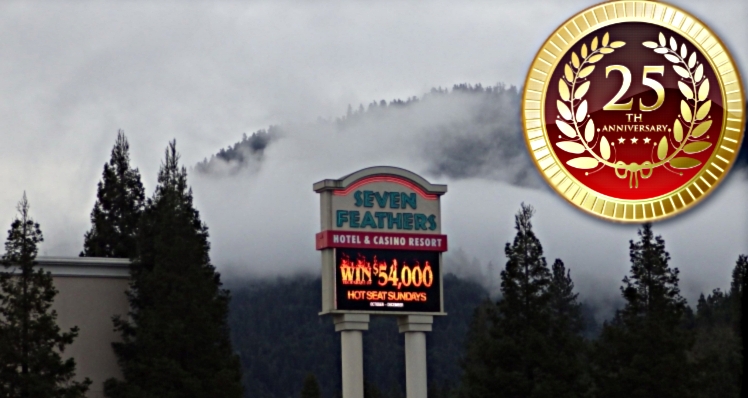In Oregon, the Cow Creek Band Of Umpqua Tribe Of Indians is reportedly celebrating the 25th birthday of its Seven Feathers Casino Resort along with its efforts that transformed a once small bingo hall into a giant Class III enterprise that has raised millions of dollars for the 1,750-member tribe’s numerous housing, education and health care programs.
According to a report from the local The News-Review newspaper, the tribe was federally recognized in 1982 and used some of a $1.5 million settlement it later received from the federal government for the loss of its land to purchase a former Douglas County motel.
After much deliberation and subsequent to having the land placed into trust, 1992 saw the south-west Oregon tribe reportedly became the first in the state to open a bingo operation with the inauguration of its 9,600 sq ft Cow Creek Bingo Hall.
“We were in a down economy and people were kind of anxious to see how we could promote the area,” Michael Rondeau, Chairman for the Cow Creek Gaming Commission, told the newspaper. “Those of us who worked for the tribe actually put our boots on and went down and finished laying sod. We were right down to the wire for opening day.”
The News-Review reported that the small enterprise with only 33 employees soon proved so popular that the next year saw the Cow Creek Band Of Umpqua Tribe Of Indians add 36 slots to its offering before carrying out a major expansion in 1996 that quadrupled the re-named venue’s size and included a 140-room hotel along with more machines, a gift shop, a convention center and a restaurant.
“It is something that I never realized was going to take off the way it did,” Robert Van Norman, Treasurer for the Cow Creek Band Of Umpqua Tribe Of Indians, told the newspaper.
However, The News-Review reported that 1997 was the watershed year for the Seven Feathers Casino Resort after the Bureau Of Indian Affairs approved an agreement between Oregon and the tribe that paved the way for Class III gaming and saw the Cow Creek Band Of Umpqua Tribe Of Indians agree to hand over 6% of its future casino profits to local non-profit organizations.
“We were always so careful when we made decisions,” Rondeau told the newspaper. “We wanted to do something that the people of Douglas County had never experienced but we wanted to do it in a safe and productive way.”
In 2001, a 17,000 sq ft extension was reportedly built to bring the size of the Seven Feathers Casino Resort up to 80,000 sq ft before a sports bar, poker room and additional slot machines were added. After only four years and the facility just north of the city of Canyonville grew again with its recreational vehicle park being expanded to 194 spaces while 2006 saw its hotel enlarged to 300 rooms to bring the entire facility up to 240,000 sq ft.
Today, the newspaper reported that the Seven Feathers Casino Resort, which has a workforce of about 1,000, serves as a magnet for tourists to the area and offers 24-hour gaming via hundreds of slots alongside games such as baccarat, roulette, craps, poker and keno. Its original quonset hut home now serves as a warehouse with the casino built over its top while visitors are additionally able to enjoy multiple bars and restaurants along with an art gallery and a spa.
“For many tribes, [gaming] has been a god-send,” Rondeau told The News-Review. “I think there’s no question that gaming has provided a lot of positive impacts to communities, especially to those in rural locations.”



